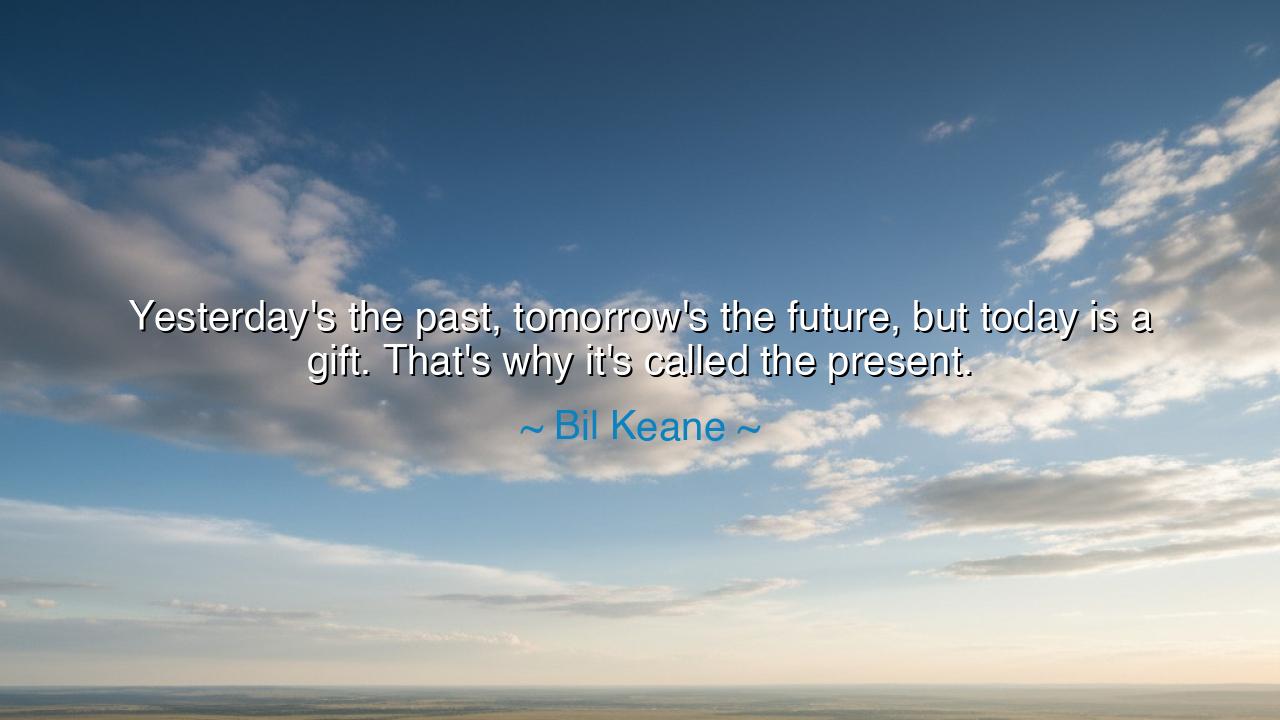
Yesterday's the past, tomorrow's the future, but today is a gift.
Yesterday's the past, tomorrow's the future, but today is a gift. That's why it's called the present.






When Bil Keane so wisely said, “Yesterday’s the past, tomorrow’s the future, but today is a gift. That’s why it’s called the present,” he encapsulated a timeless truth that has resonated through the ages: the importance of living in the present moment. Too often, we are consumed by what has passed, weighed down by regret or nostalgia for what we can no longer change. Likewise, we are often fixated on the future, obsessed with what we must achieve or what might come to pass. Yet, Keane’s words serve as a reminder that today, the moment we find ourselves in, is a precious gift, one that we must cherish and embrace if we are to live fully.
The ancients were keenly aware of the fleeting nature of time, and their teachings were rooted in the notion that time, like a river, flows ever forward, carrying us from one moment to the next. Heraclitus, the Greek philosopher, famously declared, “You cannot step into the same river twice.” Time is ever-changing, ever-moving, and we, as humans, must learn to flow with it. Like the river, we cannot hold onto yesterday’s waters, nor can we predict tomorrow’s currents. The wisdom of the ancients teaches us that the present moment, though it is ever slipping away, is where true life happens. It is the only time that is truly ours to shape.
This sentiment is echoed in the teachings of Buddha, who advised, “Do not dwell in the past, do not dream of the future, concentrate the mind on the present moment.” Buddhism teaches that the present moment is all we truly have; everything else is a shadow of what has been or what is yet to be. The concept of mindfulness, so central to Buddhism, asks us to become fully aware of the present, to feel the earth beneath our feet, to listen to the wind in the trees, and to savor each breath as a reminder of the gift we hold in the here and now. In a world that often races forward, these ancient teachings remind us that true peace and happiness can only be found in the present, not in the past or the future.
Consider the story of Alexander the Great, whose military campaigns spanned across continents and whose name is synonymous with glory. Yet, in his pursuit of conquest, Alexander was constantly looking to the future, to the next battle, the next victory. It was only in his final years, when faced with the inevitable march of time, that Alexander began to realize that the present—his life as it was unfolding—was just as important as the future he had been so focused on. On his deathbed, as he saw the fruits of his conquests fade before his eyes, he understood that the present had always been the true gift, but by then, it was too late to enjoy it fully. Alexander’s story teaches us that while ambition and drive for the future are powerful, they should not blind us to the beauty and potential of the present.
Similarly, in the life of Marcus Aurelius, the Roman emperor and philosopher, we find wisdom about the present that transcends time. In his Meditations, he often reflects on the transient nature of life and the importance of focusing on what is within our control—the present moment. Aurelius, though ruling an empire, found solace in the idea that time could not be controlled, only embraced in the now. His reflections remind us that while we cannot change the past or dictate the future, we can act in the present, with wisdom, intention, and clarity.
The deeper lesson we can take from Keane's quote and the ancient teachings is that the present is where life happens. The past is a story we can no longer alter, and the future is a mystery we cannot fully predict. Yet today—right now—is our gift, the only time in which we can act, create, and become who we are meant to be. To squander this moment by fixating on what has been or what is to come is to miss the very point of life itself.
So, let us learn to embrace the present moment. Let us not be shackled by the chains of past regrets or the endless worry about the future. The gift of today is all we truly have, and it is through this lens of gratitude and awareness that we find meaning in our lives. When you wake each morning, take a moment to realize the preciousness of this day, for it is a treasure. Act with intention, savor the now, and remember: the present is not just the moment in which we exist, but the only moment that is truly ours to shape.






AAdministratorAdministrator
Welcome, honored guests. Please leave a comment, we will respond soon